If you are a website manager, developer, or designer tasked with managing optimising the title tags on your website, you are in the right place. This article is about optimising your website title tags for Google. It includes best practices sourced directly from official Google webmaster documentation and observations and opinions by the author.
The author has over 20 years of experience in SEO and website development.
To help you track your progress, the title tag SEO checklist is available as a free Google spreadsheet and also as a free Excel spreadsheet.
Here is a checklist:
- Does the page title accurately describe the content on the page?
- Do you create unique <title> elements for each page on your website?
- Are your page titles brief but descriptive, with no extremely lengthy or unhelpful text, or unneeded keywords?
- Are <title> elements descriptive and concise, avoiding vague descriptors like “Home” or “Profile”?
- Are <title> elements not unnecessarily long or verbose?
- Does the website avoid keyword stuffing in the <title> elements?
- Does the website avoid repeated or boilerplate text in <title> elements?
- Does the website dynamically update the <title> element to better reflect the actual content of the page?
- Does the website brand its titles concisely?
- Is it clear which text is the main title for the page?
- Is the website not disallowing search engines from crawling its pages, or if it does, is it using the noindex rule to prevent indexing?
- Is <title> element written in the same language and writing system as the primary content on the page?
Title tag SEO best practices
QUOTE: “don’t know anyone who has tested title tags more than @shaun_anderson of @Hobo_Web” Andy Beard, 2021
In short, the best practices for title tag SEO are as follows:
- Add the important keyphrase to your title element once, preferably in the first 8 words, and not beyond 12 words
- Be descriptive & relate specifically to your page
- Avoid keyword stuffing
- Avoid adding irrelevant keywords to page titles on your site
- Do not repeat page titles throughout your site
- Maximise usability across devices with a concise title element of up to 60 characters
- Use only one title per page on your page (Google combines multiple titles into one)
- Avoid long titles. Observations could indicate that you penalise yourself with long titles with irrelevant keywords on specific page-types
- When writing longer title tags ensure the first 50-60 characters include the primary keyword phrase and that this sentence makes perfect sense (because it will be truncated)
- Optimise for searcher intent where relevant using informational, commercial, navigational, and transactional principles
- Use interrogative adverbs, adjectives, and pronouns in page titles where relevant to form questions (Who, Where, Why, What, How, etc)
- Avoid extraneous boilerplate title elements across a site with many pages (site-wide keyword stuffing)
- Use sentence case for your title tags (without the full stop)
- Capitalise only the first word in your title tag (excluding nouns)
- Use punctuation sparingly in your title tags
- When using an abbreviation in your title tag, spell out the abbreviation in the first paragraph that follows the title
- Brand your site in title tags concisely, if at all
- Avoid using -ing verb forms as the first word in your page title
- Avoid contractions formed from nouns and verbs in your title tag
- Avoid double contractions in your title tag
Read on for my collected notes about title tags spanning over a decade in SEO.
What is a title tag?
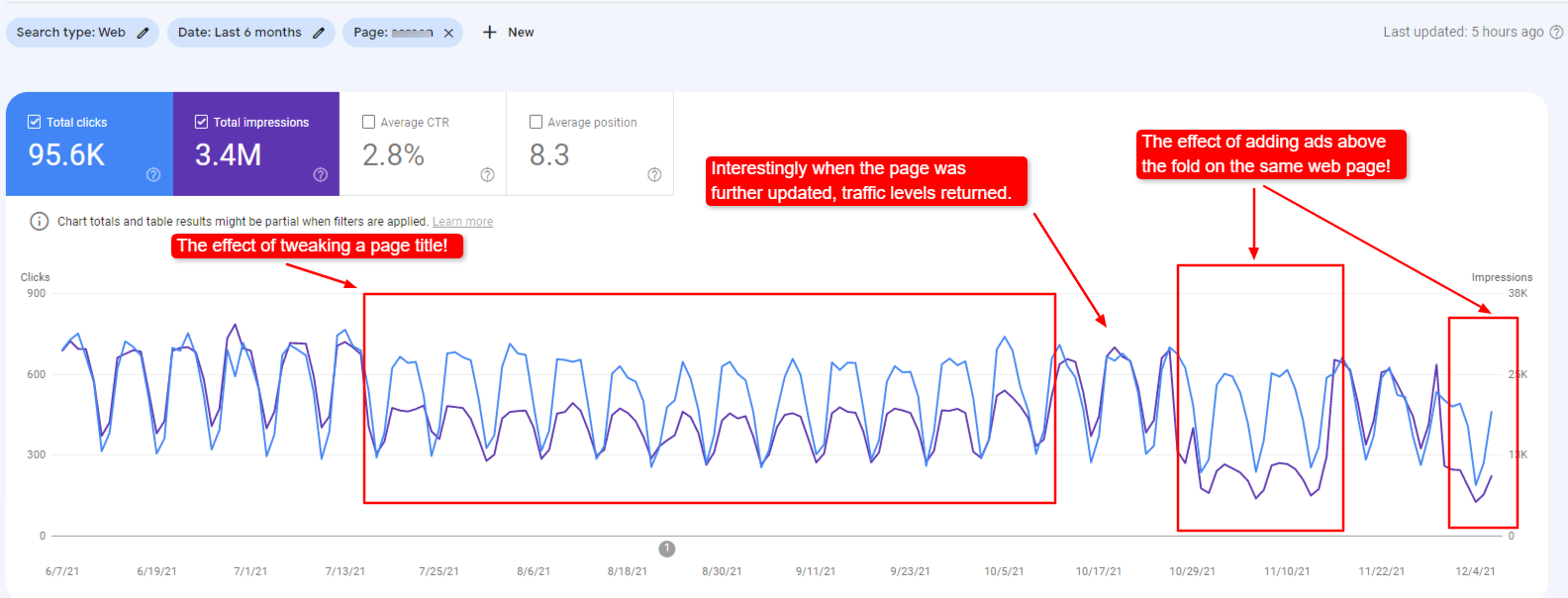
QUOTE: “A
<title>tag tells both users and search engines what the topic of a particular page is. The<title>tag should be placed within the<head>element of the HTML document. You should create a unique title for each page on your site.” Google, 2020
A page title tag is an element in HTML that defines the purpose of a web page in a concise, relevant sentence.
A title tag is more accurately an “HTML page title element” and it is very important for SEO (search engine optimisation). It is best to keep page title tags simple, concise, and highly relevant to the page it belongs to.
A page title tag that is highly relevant to the page it refers to will maximise search engine ranking performance, usability, and user experience ratings as Google measures these.
The title tag you use will probably be displayed in a web browser’s window title bar, bookmarks, and in clickable search snippet links used by Google, Bing & other search engines.
A highly relevant title tag is the “crown” of a web page with an important keyword phrase (which accurately describes the page) featuring at least once within it.
Managing page titles on your website is a key process for successful technical SEO. Visit the technical SEO checklist to learn more.
What does a title tag do?
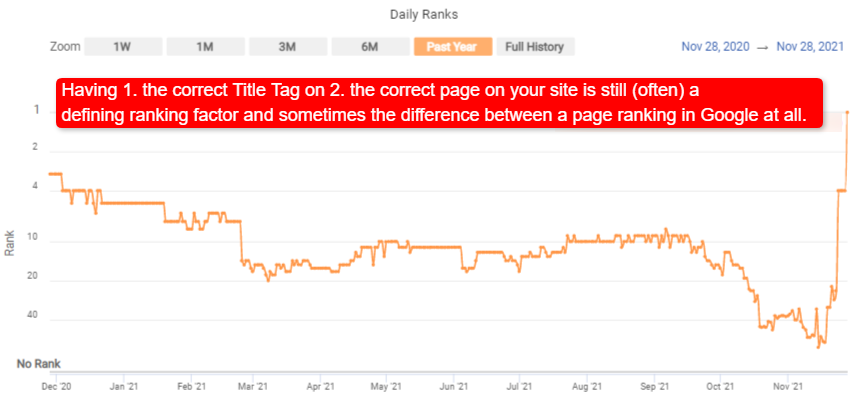
QUOTE: “All HTML and XHTML documents, including those in individual frames in a frameset, have a
titleelement in theheadsection that defines in a simple phrase the purpose of the document. This helps users to orient themselves within the site quickly without having to search for orientation information in the body of the page. Note that the (mandatory)titleelement, which only appears once in a document, is different from thetitleattribute, which may be applied to almost every HTML and XHTML element.” W3C, 2020
Traditionally title tags have been an important ranking signal for search engines like Google when ranking web pages.
A title tag describes a document (page), and that title tag often forms the text in a link to that document in browsers, bookmarks, and Google.
Web page title tags can be used in your snippet as a link to your page on Google SERPS. A high-quality, highly relevant title tag increases the click-through rate and improves where a page ranks in Google SERPs.
Low-quality keyword-stuffed or misleading titles are a bad user experience and Google demotes sites for bad user experience practices. Google has specific recommendations on high-quality titles in both Google webmaster guidelines and search quality evaluator guidelines.
Do keywords in title tags help your page rank better?
Yes, usually.
Keywords (or rather, keyword phrases) in page titles can help your pages rank higher on Google results pages (SERPs) for relevant queries. The page title is also often used by Google as the title of a search snippet link in search engine results pages.
Keywords you use in page titles often end up as links to your web page (and this can be very important).
QUOTE: “We do use it for ranking, but it’s not the most critical part of a page. So it’s not worthwhile filling it with keywords to hope that it works that way. In general, we try to recognise when a title tag is stuffed with keywords because that’s also a bad user experience for users in the search results. If they’re looking to understand what these pages are about and they just see a jumble of keywords, then that doesn’t really help.” John Mueller, Google 2016
Ranking top in Google is about so much more than just optimising one element of a page.
A page title tag is still, however, arguably the most important individual on-page SEO element to address on a web page, if it is relevant to a high-quality page.
QUOTE: “I’d just write natural titles, the way you’d want them to appear in search, and how you’d want to present them for users. Slash (separators) is fine & can perform well anywhere.” John Mueller, Google 2020
How many keyword phrases are in a page title tag?
Keep the focus on one primary keyword phrase for each web page. You can add modifiers to the title tag, like geographic location details, or use more words to be more specific about one primary keyword phrase for the page.
Be careful optimising single title tags for multiple keyword phrases that do not accurately describe the page. You may find some rankings improve while some are diluted, considerably.
Keywords beyond 12 words in a title were much less powerful than one instance in visible page copy, in historic testing.
Does Google use title tags as SERP snippet titles?
QUOTE: “Of all the ways we generate titles, content from HTML title tags is still by far the most likely used, more than 80% of the time.” Google Search Central Blog, 2021
Yes, often, but not always.
Of all the ways we generate titles, content from HTML title tags is still by far the most likely used, more than 80% of the time.
They may even use your page title as the title in your search engine results page listing.
QUOTE: “If your document appears in a search results page, the contents of the title tag may appear in the first line of the results.” Google, 2020
Note that the text link Google DISPLAYS as your page snippet title can change dynamically.
A search snippet title has been historically query dependent. If you want to almost ensure a page title will display in full in google.co.uk on a desktop machine – stick to about 50-60 characters in length max – although if you do that – you are missing out on some longer tail ranking benefit.
The same page might have at least a few variations displayed in Google, all dependent on words typed by the user, and this process starts as soon as a page is published ….and over time links and other data soon give Google even more options to change that search snippet title.
You can in most instances prevent Google from changing your title tag if you are succinct and a little more careful when creating the title tag, so Google is not compelled to modify it.
QUOTE: “We introduced a new system of generating titles for web pages. Before this, titles might change based on the query issued. This generally will no longer happen with our new system. This is because we think our new system is producing titles that work better for documents overall, to describe what they are about, regardless of the particular query.” Google Search Central Blog, 2021
Is there a title tag character limit on desktop browsers?
Yes.
Google will often present shorter page title SERP snippets to desktop users than to mobile users.
Here is an example from June 2020 where Google is truncating a long title (which is from a title tag 70 characters in length) to 60 characters for desktop visitors in the UK:

Is there a title tag character limit on mobile browsers?
Yes.
Google will often present longer page title snippets to mobile users than to desktop users.
How many characters will Google display as a SERP snippet title on mobile devices?
The following screenshot is what Google displays to mobile visitors from June 2020 and that is a SERP snippet title of 80 characters (when the brand name is attached):
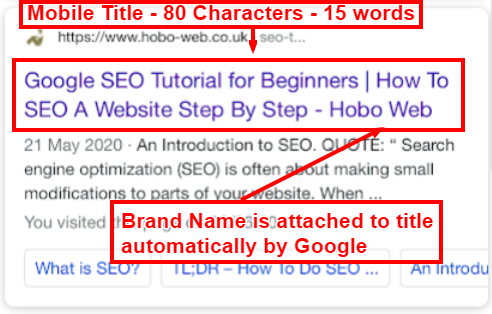
The mobile version displays more characters than the desktop (and in this example displays a snippet title (generated from the Title Tag itself) that is 70 characters in length.
Today it is not possible to lay down an exact number of characters for page snippets in Google as it is user and device-dependent. Google displays as many characters as it can fit into a block element that’s about 600 pixels wide.
So – THERE CAN BE NO EXACT AMOUNT OF CHARACTERS any SEO can lay down as exact best practice to GUARANTEE your title will display, in full in Google, at least.
Ultimately, the characters and words you use to create the page title will determine if your entire page title will be seen in a Google search snippet on any specific device.
You may find success with titles that come to much more than 60 characters (sometimes, whatever characters 12 words amount to). This is especially true for longer-tail queries.
It is important to note you should keep the important keyphrase near the beginning of your title so that the page title element accurately describes the page content to a user on any desktop device, regardless of limits.
Visit the mobile SEO checklist to learn more about mobile SEO.
Why is your Google listing different from your title tag?
QUOTE:”We try to show a relevant useful title. So there’s lots of different heuristics that we can use….So if you have a bad title or a title that we don’t think helps users as much, we can try to find a better title. And one that we think will be an informative result so that users will know whether that’s a good result for them to click on.” Matt Cutts, Google 2009
In short, Google will often make up its own snippet title for the page, if it thinks it can create a better link title in SERPs, based on what it knows about the page from internal links, content, HTML markup, and links from other sites to this page.
I thought I would list some of the more obvious reasons your homepage title seems wrong in Google search results:
- Google will look in your page <title></title> tags in the HEAD for your page title information, to display as the link to your page in search results (SERPs)
- If you’ve made changes recently to optimise your page title for search engines, it might very well be just that Google doesn’t know yet, because it’s not visited your page since you made the change. So give it time. Check the Google CACHE link under your listing in search engines to see which page Google is “supposedly” using for your page (it’s usually accurate).
- The title element on the page can be malformed in some way. I’ve shown before how search engines can choose to use a Heading ‘tag’ as a Page title, or ignore the page title completely if you’re a spammer in the making – so ensure your Page Title is properly marked up and starts with and ends with and is in the HEAD of your document – and there is only one.
- Another reason is you may be confusing Google in some way by getting to the correct page title, and/or displaying it in results, using directives in your meta tags or Robots.txt. When Google knows about the page because other pages link to it, it CAN link to your page with those descriptive keywords, it might very well use these links on third-party pages to determine what that page title should be if it decides to include the URI in its listings, and you certainly don’t want that.
- Google uses many signals to help create a search snippet title these days, and will use elements or attributes of your page, or the information in links to your page, to create a snippet title, based on what a searcher typed in.
An intelligent, well-formed page title, that is highly relevant to the page, and not duplicated on other pages of your site, is just about the most important single thing you can do to ‘SEO’ a page on your site – after you’ve got some text to put a title on, of course.
QUOTE: “Titles can be both short and informative. If the title is too long or otherwise deemed less relevant, Google may show only a portion of it or one that’s automatically generated in the search result. Google may also show different titles depending on the user’s query or device used for searching.” Google, 2020
Google works VERY differently since the days I started publishing results on such SEO tests. I kept some of the information below on this page to show how SEOs learned what Google seemed to like, and how you tested such a thing, in case anyone is interested in the future.
With DYNAMIC SERP snippets – Google is free to ignore the page title you use – and will choose the best title for your search snippet, based on what it thinks, is the most relevant text, to a search query.
It is now VERY COMMON for Google to create its own search snippet title, all but effectively ignoring the title you specified for the page (especially if that title is a little keyword stuffed, misleading or a bad user experience).
Example:

and

Dynamic snippet titles seem to key off various signals – from anchor text pointing to the page in question, or from the page title itself, or from Headers (h1-h6) – all based on what the searcher actually typed in.
I see a lot of folk asking in forums why their snippet title is different from their page title, and it’s probably that you just now can’t ever guarantee what title Google will pick to match to a phrase (unless you control the linking of course – more of that below).
SEOs are used for very dynamic DESCRIPTIONS in the snippet. Google is MUCH more confident at stretching that dynamism to the snippet title these days, and not just using this to ‘repair’ malformed or very unhelpful titles.
Perhaps EVEN more of a reason to mix up the anchor text pointing to a page, and create unique page titles that are different from H1 headers, etc… Note – There are other reasons your page title is wrong on Google (see below).
QUOTE: “If Google is rewriting your titles, that is a sign you should work on rewriting those titles.” Jennifer Slegg, 2019
Should you include your brand name in your title tags?
QUOTE: “Consider including just your site name at the beginning or end of each
<title>element, separated from the rest of the text with a delimiter such as a hyphen, colon, or pipe.” Google Webmaster Guidelines, 2021
If you have a recognisable brand, yes, but do it concisely.
If not, you could leave your brand out of most title tags and leave more space to describe the page content more accurately.
If your page title tag is concise enough, Google will often automatically append the site brand name to the end of the title tag.
Whatever your home page title tag is, Google often appends this description of your brand to pages with short title tags. This would be another reason not to keyword stuff your home page title tag.
How does Google deal with duplicate title tags?
Google combines multiple title tags together to form one title tag for the page. This is probably limited to a certain number of words (Google has never confirmed this number since 1998).
QUOTE: “So, if you’re including a second meta description tag on a page we will treat that the same as if you just extend the existing meta tag on the page.…there’s no kind of bonus to using a second meta description tag on a page compared to just adjusting your existing one. With regard to the title, that’s the same thing. It’s not that there’s any kind of a bonus attached to making a second title tag. Essentially, you might as well just write a clear new title using the existing title tag.” John Mueller, Google 2020
You should only have one title element on a page, for many reasons.
How many characters maximum in a title tag?
QUOTE: “Is there a value in having <i>title</i> tags that are longer than the displayable space and the sections of it? Yes.” Google, 2021
Google changes everything at some point, and live tests Google performs introduce changes to many SERPS.
The following observation about average title lengths in Google search snippets could have been to do with Google slightly testing larger fonts, for instance.

FYI : “Usability studies would suggest sticking to a page title of 64 characters or less. SEO testing would indicate 12 words maximum Google will count as a title tag. Somewhere in the middle lies the perfect title tag, especially influencing longer-tail searches” Hobo, 2020
- The last time I looked Google displayed as many characters as it can fit into a block element that’s about 600px wide and doesn’t exceed 1 line of text (on desktop). The point is – THERE IS NO BEST PRACTICE AMOUNT OF CHARACTERS any SEO could lay down as exact best practice to GUARANTEE a title will display, in full in Google, at least, as the search snippet title, on every device. Ultimately – only the characters and words you use will determine if your entire page title will be seen in a Google search snippet.
- If you want to *ENSURE* your FULL title tag shows in the DESKTOP UK version of Google SERPs, stick to a shorter title of between 50-60 characters but that does not mean your title tag MUST end at 60 characters, and remember your mobile visitors see a longer title (in the UK during June 2020 up to about 80 characters). What you see displayed in SERPs depends on the characters you use. I just expect what Google displays to change – so I don’t obsess about what Google is doing in terms of display.
- Google is all about ‘user experience’ and ‘visitor satisfaction’ so it’s worth remembering that usability studies have shown that a good page title length is about seven or eight words long and fewer than 64 total characters. Longer titles are less scanable in bookmark lists, and might not display correctly in many browsers (and of course probably will be truncated in SERPs).
- Google will INDEX perhaps 1000s of characters in a title… I think there is a limit of 12 words maximum that Google will count AS a TITLE TAG when determining the RELEVANCE OF A DOCUMENT for ranking purposes. It is a very hard thing to try to isolate accurately with all the testing and obfuscation Google uses to hide its ‘secret sauce’. I have had ranking success with longer titles up to 12 words – much longer titles – in the PAST. Google certainly can read ALL the words in your page title (unless you are spamming it silly, of course) but in recent tests I see them ignoring keywords in the title tag that go beyond the 12-word limit.
- Note that Google is pretty good these days at removing any special characters you have in your page title – and I would be wary of trying to make your title or Meta Description STAND OUT using special characters. That is not what Google wants, evidently, and they do give you a further chance to make your search snippet stand out with RICH SNIPPETS and SCHEMA markup.
How many words maximum in a title tag?
QUOTE: “If it fills up your screen, then probably it’s too long, but if it just one sentence that fits on one line or two lines, you’re not going to get a manual action for it.” Google, 2021
You can probably include up to 12 words that will be counted as part of a page title, and consider using your important keywords in the first 8 words. The rest of your page title could be ignored completely.
Many years ago I tested how many keywords will Google read in the title tag/element using a simple test. And here are some of the observations, which were quite surprising.
First – here’s the test title tag I tried to get Google to swallow. And it did. All of it. Even though it was a bit spammy;
HoboA HoboB HoboC HoboD HoboE HoboF HoboG HoboH HoboI HoboJ HoboK HoboL HoboM HoboN HoboO HoboP HoboQ HoboR HoboS HoboT HoboU HoboV HoboW HoboX HoboY Hob10 Hob20 Hob30 Hob40 Hob50 Hob60 Hob70 Hob80 Hob90 Hob11 Hob12 Hob13 Hob14 Hob15 Hob16 Hob17 Hob18 Hob19 Hob1a Hob1b Hob1c Hob1d Hob1e Hob1f Hob1g Hob1h
Using a keyword search – hoboA Hob1h – we were surprised to see Google returned our page. We also tested it using – Hob1g Hob1h – the keywords right at the end of the title – and again our page was returned.
So that’s 51 words, and 255 characters without spaces, 305 characters with spaces, at least! It seems clear Google will read a title length of just about any amount – hence why some SEO do use very long titles.
At the time Qwerty pointed out an interesting fact about the intitle: site operator in Google.
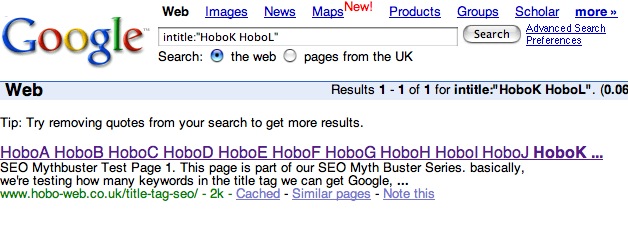
…..results as expected. But next in the sequence returns the following, unexpected result…..
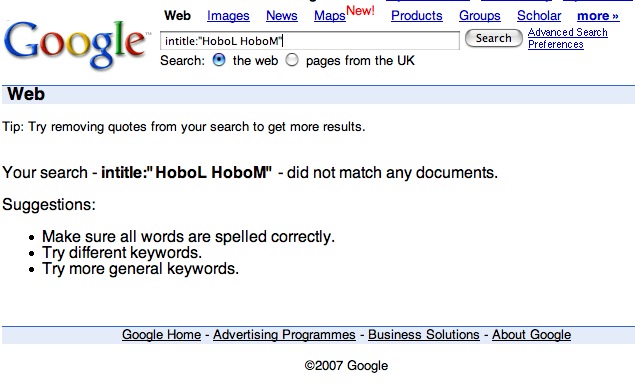
So what did this tell us? Google seemed to stop at the 12th word on this page at least when returning results using the intitle: site operator.
I’m obviously not sure what benefit a title tag with this many keywords in it has for your page, with regard to keyword density / dilution, and “clickability” in the search engine results pages (SERPs).
50 plus words in a title is certainly not best practice.
As a result of observations over the years, I’ve generally expected Google to count about 12 words as a page title.
In fact, every time I’ve tested it I come up with 12 words in the page title element for Google.
The biggest change I’ve seen in any testing in this area is that Google ignores words in your title over the 12 word limit. That is, they do not append extra keywords in the title tag to the document anymore.
There is no limit to the words Google will recognise in a Title. Google will rank a 32 word title tag for that specific query (32 is the maximum length of a query in Google) even if the words are not on the page and only in the title.
How to SEO title tags
QUOTE: “Page titles should be descriptive and concise.” Google, 2020
There is no one-size -fits -all formula for creating the perfect title tag as the perfect title tag is perfectly relevant to the words that are on a specific page. An effective page title is created with how people search for things on the page in mind.
It’s difficult for me to describe an abstract but basically, it does all come down to keywords and keyword phrases taken from text on the page (naturally) and expected popular/valuable search phrases (based on data available).
Different kinds of pages require different kinds of title tags. For certain pages, the perfect page title might change over time to guarantee diversity in anchor text to the page, as the title ends up often used as anchor text in backlinks from other sites. For some pages – a more permanent page title might suffice.
The perfect page title for the page is usually going to be very page dependent and eventually user query dependent.
I will use a long title if it suits the page content. Vice versa, I will use a short title if that suits the page better.
I rarely try and be sensational with my titles. My titles are functional. And longer than some best practices. I very rarely trim my titles to meet a recommendation lay down by any third party.
I’ll often post a functional title and then revisit it after I publish it once I observe how it is performing against competing pages, or have made an error or have new inspiration to modify it.
I expect my page titles to change over time for I am usually testing and optimising.
For me, a perfect title tag in Google is going to be dependent on a number of competing factors;
- Most modern search engines have traditionally placed a lot of importance in the words contained within this HTML element. A good page title is made up of keyword phrases of value and high search volumes.
- You can probably include up to 12 words that will be counted as part of a page title, and consider using your important keywords in the first 8 words. The rest of your page title historically was counted as normal text on the page, but in recent tests keywords over the 12th keyword were ignored completely.
- NOTE, today, the HTML title element you choose for your page, may not be what Google chooses to include in your SERP snippet. The search snippet title and description is very much QUERY & DEVICE dependent these days. Google often chooses what it thinks is the most relevant title for your search snippet, and it can use information from your page, or in links to that page, to create a very different SERP snippet title.
- When optimising a title, you are looking to rank for as many terms as possible, without keyword stuffing your title. Often, the best bet is to optimise for a particular phrase (or phrases) – and take a more long-tail approach. Note that too many page titles and not enough actual page text per page could lead to doorway page type situations. A highly relevant unique page title is no longer enough to float a page with thin content. Google cares WAY too much about the page text content these days to let a good title hold up a thin page on most sites.
- Some page titles do better with a call to action – a call to action which reflects exactly a searcher’s intent (e.g. to learn something, or buy something, or hire something. THINK CAREFULLY before auto-generating keyword phrase footprints across a site using boiler-plating and article spinning techniques. Remember this is your hook in search engines, if Google chooses to use your page title in its search snippet, and there is a lot of competing pages out there.
- The perfect title tag on a page is unique to other pages on the site. You REALLY need to make your page titles UNIQUE (ESPECIALLY RELEVANT TO OTHER PAGES ON YOUR SITE), and minimise any duplication, especially on larger sites. Duplicate page titles across a site are often a sign of poor indexation control or doorway type pages.
- I like to make sure my keywords feature as early as possible in a title tag but the important thing is to have important keywords and key phrases in your page title tag SOMEWHERE.
- For me, when SEO is more important than branding, the company name goes at the end of the tag, IF ADDED AT ALL, and I use a variety of dividers to separate as no one way performs best. If you have a recognisable brand – then there is an argument for putting this at the front of titles – although Google often will change your title dynamically – sometimes putting your brand at the front of your snippet link title itself. I often leave out branding. There is no one size fits all approach as the strategy will depend on the type of page you are working with.
- I like to think I write titles for search engines AND humans.
- Know that Google tweaks everything regularly – why not what the perfect title keys off? So MIX it up…
- Don’t obsess. Natural is probably better, and will only get better as engines evolve. I optimise for key-phrases, rather than just keywords.
- I prefer mixed case page titles as I find them more scan-able than titles with ALL CAPS or all lowercase.
- Historically the more domain trust, authority or relevance about a topic your SITE has on Google, the easier it is for a new page to rank for something. So bear that in mind. There is only so much you can do with your page titles – your websites rankings in Google are a LOT more to do with OFFSITE factors than ONSITE ones – negative and positive.
- Click satisfaction (whatever that is) is something that is likely measured by Google when ranking pages (Bing say they use it too), so it is really worth considering whether you are best optimising your page titles for user click-through satisfaction or optimising for more search engine rankings (the latter being risky). I would think keyword stuffing your page titles could be one area that Google could look at.
- Remember….think ‘keyword phrase’ rather than ‘keyword’, ‘keyword’ ,’keyword’ . Use your page title text to target a less competitive long tail search term, especially if you are up against stiff competition.
- Google will select the best title it wants for your search snippet – and it will take that information from multiple sources, NOT just your page title element. A small title is often appended with more information about the domain. Sometimes, if Google is confident in the BRAND name, it will replace it with that (often adding it to the beginning of your title with a colon, or sometimes appending the end of your snippet title with the actual domain address the page belongs to).
- Beware of repeating keywords unnecessarily, keyword stuffing or using boilerplate text to create your titles. Any duplication that is perceived by Googlebot as manipulation is easily down-ranked by algorithms.
- Do not spam title tags (changing dates for instance in Page Titles without updating the page)
What are low-quality title tags?
QUOTE: “Avoid keyword stuffing. Avoid repeated or boilerplate titles.” Google, 2020
Google often rewrites title tags depending on the query (but this is also a possible sign of low-quality titles)
When you write a page title, you have a chance right at the beginning of the page to tell Google (and other search engines) if this is a spam site or a quality site – such as – have you repeated the keyword 4 times or only once?
I think title tags, like everything else, should probably be as simple as possible, with the keyword once and perhaps a related term if possible.
I always aim to keep my HTML page title elements relatively simple, and look as human-generated and unique, as possible, although it is easy to end up stuffing keywords in there.
Spammy title tags can also look really ugly. Your audience might not like ugly title tags, whereas another audience might not care.
As I said, page titles are ‘arguably the most important on-page SEO factor to address on any web page’ other than the primary main content, and as such, they may be used by Google against you if they detect an intent to rank higher by low-quality techniques.
Optimising your titles was traditionally the first place to go to improve your rank in Google, so it is quite reasonable that Google would use this against you if it wanted to. Yes – keyword stuffing works and might bring you traffic in the short term – but it may be that over time the benefit you get for this is pegged back, and wider site ‘quality signals’ are impacted, leading to less traffic than you would have got if you didn’t keyword stuff your titles.
That doesn’t mean you can’t have long titles. It just means don’t use the CMS and boilerplate methods to generate them. If you do employ long titles, make sure it is not just repeating the same words over and over again, and the title is uniquely relevant to that page.
For now – I would stick to very concise titles on pages and leave all boiler plating out. If it is machine-generated, keep it very simple (and that advice probably fits for most of us).
If you are doing anything other than the above to drive more organic traffic to a page using the age-old tactic of page title optimisation, you might run smack bang into the Google Quality Algorithms.
Will Google penalise keyword-stuffed title tags?
Yes.
The Google manual quality raters are on the lookout for poor titles, too:
QUOTE: “Titles of pages or links/text in the SC that are misleading or exaggerated compared to the actual content of the page. This can result in a very poor user experience when users read the title or click a link only to find that the page does not match their expectations. ” Google Search Quality Rater Guide 2017
Note that:
QUOTE: “Misleading Titles… may also justify a Low rating.” Google Search Quality Rater Guide 2017
Some time ago I showed if you had a long spammy page title Google would ‘forgive you’.
At one time the recent past Google seemed to count the first 8-12 words (while displaying about 70 characters in a desktop search snippet) and then just seem to count the rest of the words found in the title as part of page text but it would not obviously penalise you for a massive title.
I’ve only ever seen one obvious case of Google ‘maybe’ responding negatively to a very spammy title.
A company contacted me to ask:
I was looking to see why my site has not been getting any hits
I Looked at the home page title:
Company Name – xxxxxxx, telephone, health and safety, xxxxxxx, scanner, PC, fax, monitor, xxxxxx, keyboard, office equipment, cleaning, cleaning service‚ cleaning company, computer cleaning, xxxxxxxx cleaning, PC cleaning, dust control, telephone cleaning, computer xxxxxx cleaning, anti static, xxxxxx room, printer cleaning, xxxxxxx display unit, raised access xxxxxx, preventative maintenance, zinc dust, anti static mat‚ xxxxxxx room, anti static flooring, xxxxxxx room, computer cleaning equipment, keyboard cleaning, companyname uk
Google showed no title in the page title link in the SERPs:
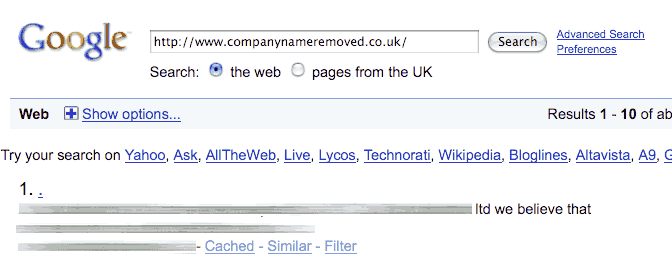
There was H1s on the page (multiples too) – but perhaps if created correctly at the time, Google would have used a H1 as the title tag. Unfortunately, the site in this example was using images as H1 Tags too.
So, this could have been more about sloppy code, than actual penalty.
Over the course of my career, I’ve not made many observations of Google really penalising for keyword stuffing relevant page title elements. However, this sort of abuse (keyword stuffing titles) may well be rolled into your site overall ‘quality scores’.
What if the title tag is ‘malformed’?
Google can use the information in anchor text links pointing to the page and other on page elements on the page to form a link on search engine results pages.
This SERP screenshot from a few years ago is an example of Google using a H6 to form the snippet title.
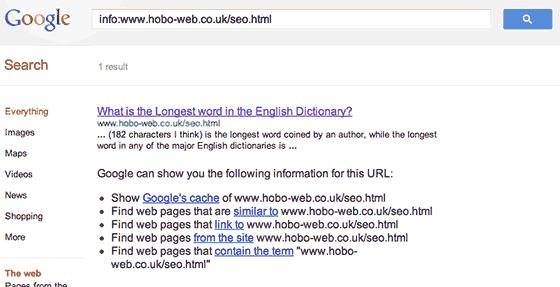
Google CAN use the next available Heading on a page as its SERP snippet link, be it a H1, H2, H3, H4, H5 or H6 but that’s not to say they will. Google changed and then was happy to label a page like this ‘untitled’ rather than put that much work into making sense of this specific page.
Expect Google to modify your page titles in your SERP snippet – at some point – especially if they are too verbose.
Can you use Javascript to create title tags?
Yes:
QUOTE: “Google supports the use of JavaScript to provide titles, description & robots meta tags, structured data, and other meta-data. When using AMP, the AMP HTML page must be static as required by the spec, but the associated web page can be built using JS/PWA techniques. Remember to use a sitemap file with correct “lastmod” dates for signaling changes on your website.”John Mueller, Google 2016
The major search engines in the world all support Javascript.
Visit the Javascript SEO checklist to learn more.
Is a title tag important For SEO?
Yes:
Having valuable keyword phrases in your page title is a must for Google to accurately work out the topic of your page, but it’s also a great opportunity for a call to action.
I would be VERY WARY of repeating keywords using boilerplate techniques throughout multiple pages on a site in an effort to improve SEO, to make them ‘unique’. If an example title tag is 50% similar to another title, or many other titles on your page – that might be not what Google would call ‘unique’ – you may be creating doorway pages and not even know it.
There are lots of opportunities to find if you experiment with more laser-focused page titles for search engines, or more engaging titles for humans, however, if you take one thing away from this article today – remember this:
A highly relevant unique page title is no longer enough to rely on if the page itself is ‘thin content’.
Google aims to rank high-quality keyword-relevant pages (with good title tags).
Single, unique, long-form quality content pieces with a well-thought-out page title perform REALLY well in Google.
That’s better for users, better for Google’s bottom line, and harder for spammers….perfect, for Google.
Google recommendations for title tags
Google recommends you:
QUOTE: “Choose a title that reads naturally and effectively communicates the topic of the page’s content.” Google, 2020
As arguably an important ranking element, it is very important NOT to keyword stuff this element across multiple pages, using boiler-plate techniques.
Google says of page titles to:
AVOID: “Choosing a title that has no relation to the content on the page.”
AVOID: “Using default or vague titles like “Untitled” or “New Page 1″.”
AVOID: “Using a single title across all of your site’s pages or a large group of pages.”
AVOID: “Using extremely lengthy titles that are unhelpful to users.”
AVOID: “Stuffing unneeded keywords in your title tags.”
Google says to rather:
DO: “Accurately describe the page’s content”
DO: “Create unique titles for each page”
DO: “Use brief, but descriptive titles”
Title tag example use
Example:
<title>What Is The Best Title Tag For Google?</title>
Google will reward keywords in Page Titles. Google’s advice is to:
QUOTE: “make sure every page on your site has a title specified in the
<title>tag.” Google, 2020
Page titles should be descriptive and concise:
QUOTE: “Page titles should be descriptive and concise. Avoid vague descriptors like
"Home"for your home page, or"Profile"for a specific person’s profile. Also avoid unnecessarily long or verbose titles, which are likely to get truncated when they show up in the search results.” Google, 2020
Avoid keyword stuffing:
QUOTE: “Avoid keyword stuffing. It’s sometimes helpful to have a few descriptive terms in the title, but there’s no reason to have the same words or phrases appear multiple times.” GOOGLE, 2020
Avoid repeated or boilerplate titles:
QUOTE: “Avoid repeated or boilerplate titles. It’s important to have distinct, descriptive titles for each page on your site. Titling every page on a commerce site “Cheap products for sale”, for example, makes it impossible for users to distinguish one page differs another. Long titles that vary by only a single piece of information (“boilerplate” titles) are also bad; for example, a standardized title like
"<band name> - See videos, lyrics, posters, albums, reviews and concerts"contains a lot of uninformative text. One solution is to dynamically update the title to better reflect the actual content of the page: for example, include the words “video”, “lyrics”, etc., only if that particular page contains video or lyrics. Another option is to just use"<band name>"as a concise title and use the meta description (see below) to describe your site’s content. The HTML suggestions page in Search Console lists any duplicate titles Google detected on your pages.” Google, 2020
Page Title Specific Google Search Operators
You may have cause to search for pages in Google with specific keywords or keyphrases in title tags.
When making your search, you can use Google Search Operators like:
- “intitle:” “keyword”
- “allintitle”: “keyword” + “keyword”
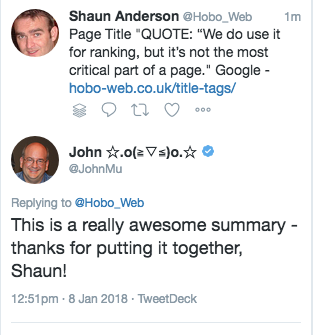

Comments are closed.